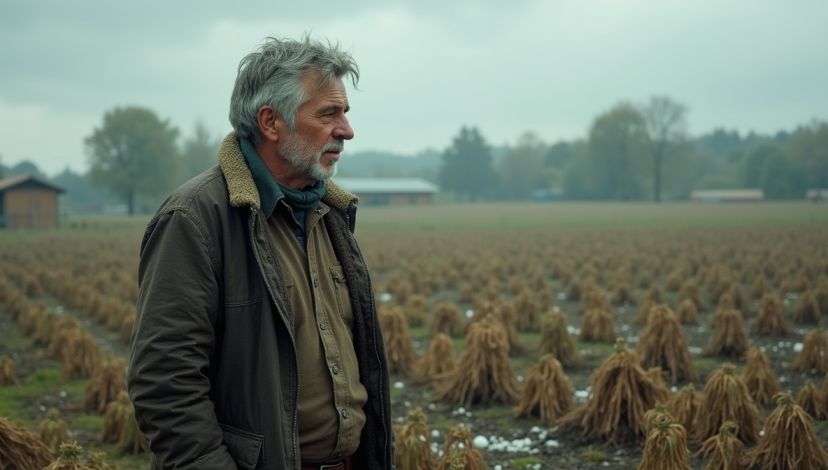
In the short story A Letter to God, everything turned out to be different. After the hailstorm, life was turned upside down for Lencho, a mere farmer who resorted to his farm produce altogether to survive. The storm destroyed his own crops, and it also rattled his feelings and his beliefs. Understanding what were Lencho’s feelings when the hail stopped leaves us with a better comprehension of how human beings usually respond to immediate loss, disappointment, and hope. This blog will consider the emotions of Lencho in simple English and in the real-life situations of the story.
Key Points:
- After the hailstorm, Lencho was completely depressed.
- He was concerned with the fate of his family and its survival.
- His belief in God did not weaken regardless of his loss.
What were Lencho’s feelings when the hail stopped, and why did he experience such deep sadness afterward?
It ceased to hail, and Lencho was too sad. He had a lot of hope before the storm as he was waiting to make a good crop that would last his family throughout the year. The hail, however, swept all the crop of his field. As he gazed upon the barren land, he could only be engulfed by a lot of regret because he understood that all his attempts were useless. The view of the bleak fields was sad to him, and he felt that this season there will be no corn to grow–in other words, no food will be around this year to feed his family.
He could have even believed that a plague of locusts would have left behind more than what the hail did. This comparison is indicative of the extent to which damage was intense in the eyes of Lencho. His disappointment in the loss of crops was not the only disappointment, but also in the broken dreams and hopes about the next year. It was such grief so that it was like a weight in his heart. According to Lencho, a hailstorm did not only mean the weather phenomenon, but it was a calamity that could cause the disappearance of his family.
Table 1 Checklist of Feelings Before and After the Hailstorm: Lencho
| Situation | Lencho’s Feelings |
|---|---|
| Before Hailstorm | Hopeful, Happy, Expectant |
| After Hailstorm | Sad, Despairing, Worried |
Note: Lencho did not only feel sad over the crops, he was afraid of hunger and what his future will look like.
What were Lencho’s feelings when the hail stopped, and what made him feel hopeless after aspiring to the desired change?
Lencho started optimistic and euphoric. He also had hope that his toil will be rewarded and his family will have food. However, in minutes, that hailstorm wiped all that away. The transition between despair and hope was severe and stinging. His prospects went downhill, where instead of having a good future in mind, he was already concerned about basic survival.
This loss of crop implied that all the work that he and his family had gone through the year was a waste. This understanding caused the feeling of great loss and powerlessness. Lencho got happy really fast, but then he became concerned and worried on how he would take care of his family. He was helpless in the face of nature, and his dreams appeared to pass away in the storm.
Table 2: Change of emotion in Lencho
| Emotion | Trigger Event | Resulting Feeling |
|---|---|---|
| Hope | Growing healthy crops | Excitement for harvest |
| Despair | Hailstorm destroys crops | Fear, sadness, uncertainty |
Reminder: Emotion can change really fast in the case of people experiencing sudden calamities.
What were Lencho’s feelings when the hail stopped, and what did he do after seeing the damage?
Hail fell, and when it was over and Lencho gazed at what had been done there was despair and determination in his eyes. He was totally devastated, yet he was not quit. Instead, he chose to get assistance in the only manner he could think of: writing a letter to God.
Lencho was a strong believer. Although Cupid had made him sad and angry, he still thought that He had God to help Him. He sent a letter requesting a financial aid to feed the family until harvest time. This act demonstrates that, even though Lencho had given up on himself, he had not lost hopes in something bigger than himself. This was a mark of his desperation and faith, which motivated him into writing the letter.
After the storm, he sleeps anxiously and full of anger, where he feels betrayed by the nature and even by God. Nonetheless, he did not become estranged to his faith. He turned his desperation into a cry of help, where it is possible to see that even in gloomy times, people can still discover some hope.
What was the impact of the emotions of Lencho on his actions and faith?
The emotions that Lencho experienced following the hailstorm played a large role in his behavior and philosophies. The depression and concern drove him towards performing an action that seemed odd to him: writing a letter to God. This was not only a request for assistance; it was an indicator that he had a firm belief in the ability to assist him, God.
He was also influenced in his perception of the world by his feelings. This misery did not make him self-abusive or somebody to blame. Rather, he believed that God would be knowledgeable of his sufferings and give him what he wanted. He had this belief, and that made him have the strength to continue even when it seemed his worst. His acts remind us that faith may be a strong weapon in a difficult period, as applied by Lencho.
The reaction to loss in people was also demonstrated in his story. There may be a few people who lose hope and go back to their faith and search for answers, even though it may be pessimistic.
So What Can We Learn Towards the Feelings and Response of Lencho?
The life of Lencho teaches valuable lessons on the way human beings cope with loss and disappointment. His narrative reminds us that one should not be surprised that he or she becomes sad and hopeless when things turn out to be disastrous. But it also indicates that people can be given the strength to go on with the help of hope and religion.
The fact that Lencho decides to write a letter addressed to God reminds the readers that one should not feel weak after seeking help. It is one of the strategies to help people exist in hard circumstances and get peace. His religion had not cured his grief, but it has offered him an explanation as to why he should continue to struggle.
The novel also brings out the unpredictability of life. Things can go wrong even when we are trying our level best and even when we have planned properly. The thing is not to settle what happens, but it is what we do in the face of these things. The mood and the behavior of Lencho demonstrate that despite the tragedy, one can keep the dreams and search for a new way.
Conclusion
When the hail ceased, Lencho was feeling very sad, hopeless, anxious, and hopeful. The crop and dreams were swept away by the hailstorm, making him fearful concerning the future of his family. Lencho believed in God very strongly, and thus, in his pains, he dared to seek help and never gave up. His biography is a very strong testament of human beings being able to have hope and power even in the face of the most difficult situations. Gaining insights into the character of the protagonist (Lencho), we come to know that belief and strength are those things that can make us stand up to the problems of life.
FAQ’s
1. How did Lencho feel when the hailstorm ceased?
He was very sad, desperate, and concerned of what would may happen to his family as a result of the hail that destroyed his crop.
2. Why did Lencho write the letter to god following the hailstorm?
His reason in writing the letter was that God alone could make him recover his loss to rescue his family out of hunger.
3. What were the changes that took place in the feelings of Lencho after the hailstorm?
His feelings turned out to be a mix of hope and joy, turning into despair, rage, and the belief in the help of God.
4. What is the morale of this response of Lencho to the disaster?
We also get to know how faith and hope may provide us with the power to tackle even the worst circumstances.
5. Did Lencho lose his faith over the hailstorm?
No, even being sad and angry, Lencho still believed in God and decided to turn to priests with the help of prayers and deeds.
![Is Wellbutrin Good for Anxiety? 7 Must-Know Facts [2025 Guide]](https://mp4moviez2.co.in/wp-content/uploads/2025/07/is-wellbutrin-good-for-anxiety.jpg)
![Beta Blockers for Anxiety: 7 Essential Benefits [2025 Guide]](https://mp4moviez2.co.in/wp-content/uploads/2025/07/beta-blockers-for-anxiety.jpg)



